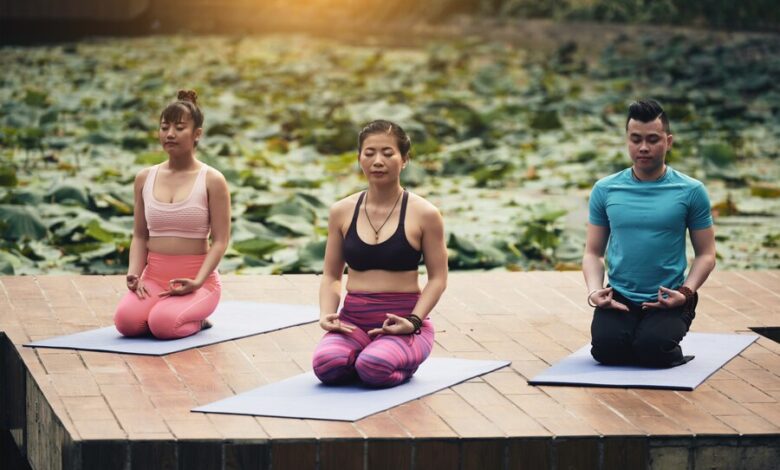Yoga and Holistic Health: A Comprehensive Guide to Well-being

Yoga, a practice with roots that focuses on physical movement, has evolved beyond its spiritual origins to become an essential component of overall well being. It is renowned not for its ability to improve flexibility and reduce stress but for its profound impact on holistic health.
Mind Body Harmony
Yoga places emphasis on integrating the mind and body fostering a connection between mental and physical well being.Through movements and breath awareness practitioners learn to synchronize their bodies and minds.
By encouraging individuals to be fully present in each movement yoga cultivates an awareness of sensations.This integration enhances clarity,reduces anxiety levels and establishes a relationship between the mind and body.
Stress Alleviation
One of the advantages of practicing yoga lies in its ability to alleviate stress. The combination of movements,controlled breathing exercises and meditation creates an effect on the nervous system thereby reducing the impact of daily sources of stress.
The practice of mindfulness during yoga trains individuals to remain focused on the moment thereby diminishing the power that stressors hold over them. This increased resilience,towards stress promotes well being well as emotional equilibrium.
Improved Flexibility
Yoga postures also known as asanas are designed to enhance flexibility by stretching and elongating muscles. Developing flexibility not only contributes to well being but also helps prevent injuries and encourages better posture.
The increased flexibility achieved through yoga leads to a range of motion minimizing the risk of muscle strains and joint injuries.Moreover improved flexibility supports mobility and functional movement.
Building Strength
Yoga encompasses more than flexibility; it also focuses on building strength. Many poses require engaging muscle groups promoting physical strength without relying on weights or intense workouts.
By holding yoga poses one can develop endurance and strength in their muscles. Unlike strength training methods yoga ensures a rounded development of muscles reducing the likelihood of imbalances that could lead to injuries.
Enhanced Posture
Yoga’s emphasis on body awareness aids in cultivating posture. Through practicing poses individuals learn how to align their spine and activate core muscles effectively reducing the chances of issues.
The attention given to alignment and body awareness during yoga practice naturally encourages a posture. As a result this helps alleviate strain on the spine while fostering an poised presence.
Improved Respiratory Function
Yoga places importance on breath control (pranayama) which promotes respiratory function.Improved lung capacity and overall respiratory health can be achieved through controlled breathing patterns.
In yoga practicing pranayama exercises helps enhance lung capacity and efficiency leading to oxygenation of the blood. This improvement in function results in energy levels and a general sense of vitality.
Mindfulness Meditation
Mindfulness meditation plays a role in yoga as it cultivates mindfulness encouraging individuals to remain present in the moment. By practicing this form of meditation, does stress decrease.Mental clarity and focus also improve. In yoga mindfulness meditation trains individuals to observe thoughts without becoming attached to them promoting an focused state that carries over into daily life. As a result,decision making abilities and concentration are enhanced.
Balanced Energy Flow
According to yoga philosophy there are energy centers within the body known as chakras. Yoga aims to balance and optimize the flow of energy through poses and breathwork exercises with the intention of promoting vitality.
By incorporating practices such as asanas (poses) and meditation into yoga routines practitioners aim to unblock any energy obstructions within their chakras for equilibrium and improved well being.
Enhanced Circulation
One of the benefits of practicing yoga is enhanced circulation.The combination of movement synchronized with breath stimulates the system facilitating blood flow throughout the body.This increased circulation ensures that tissues and organs receive oxygen blood, for cell function.
Yoga poses that involve twists and inversions are beneficial, for improving blood circulation and reducing the risk of blood pooling, which ultimately enhances health.
Boosting the Immune System
Practicing yoga has been linked to an immune system thanks to its ability to reduce stress and inflammation.The controlled breathing exercises and relaxation techniques in yoga have an impact on the production of cells strengthening the body’s defense against infections and illnesses.
The immune boosting effects of yoga go beyond health as it also helps alleviate the impact of stress on the system.This comprehensive approach builds resilience against health challenges.
Enhanced Digestion
Specific yoga poses are designed to target organs promoting digestion while alleviating issues like bloating and indigestion.Through twisting and compression movements these poses stimulate the tract leading to improved absorption efficiency and waste elimination.
Yoga practices that focus on digestion also encourage eating habits fostering an harmonious relationship with food.This overall improvement in function contributes to better gut health.
Effective Pain Management
Yoga is increasingly recognized as a method for managing pain conditions.The gentle movements, stretching exercises and mindfulness techniques employed in yoga help reduce muscle tension while promoting relaxation thereby alleviating discomfort.
The practice of yoga helps enhance the connection between the mind and body which in turn improves tolerance towards pain by shifting focus from discomfort and towards the moment.This comprehensive approach to managing pain provides relief for both emotional aspects of pain.
Emotional Well being
Yoga serves as a tool for promoting well being by encouraging self reflection and mindfulness.It offers a nonjudgmental space to explore and process emotions. Through techniques like meditation and deep breathing individuals can navigate challenges with resilience.
Engaging in yoga often leads to a release that brings about a sense of lightness and clarity.Regular practice builds strength,equipping individuals with coping mechanisms for life’s ups and downs.
Lifelong Wellness
Ultimately incorporating yoga into routines fosters a lifestyle that promotes overall wellness. By doing so individuals can experience physical,mental and emotional well being throughout their lives.
Conclusion
The impact of yoga on health extends beyond physical fitness; it encompasses mental, emotional and spiritual aspects as well. By embracing the guidance presented here in this overview individuals can embark on a journey towards well being, through their yoga practice.




One Comment